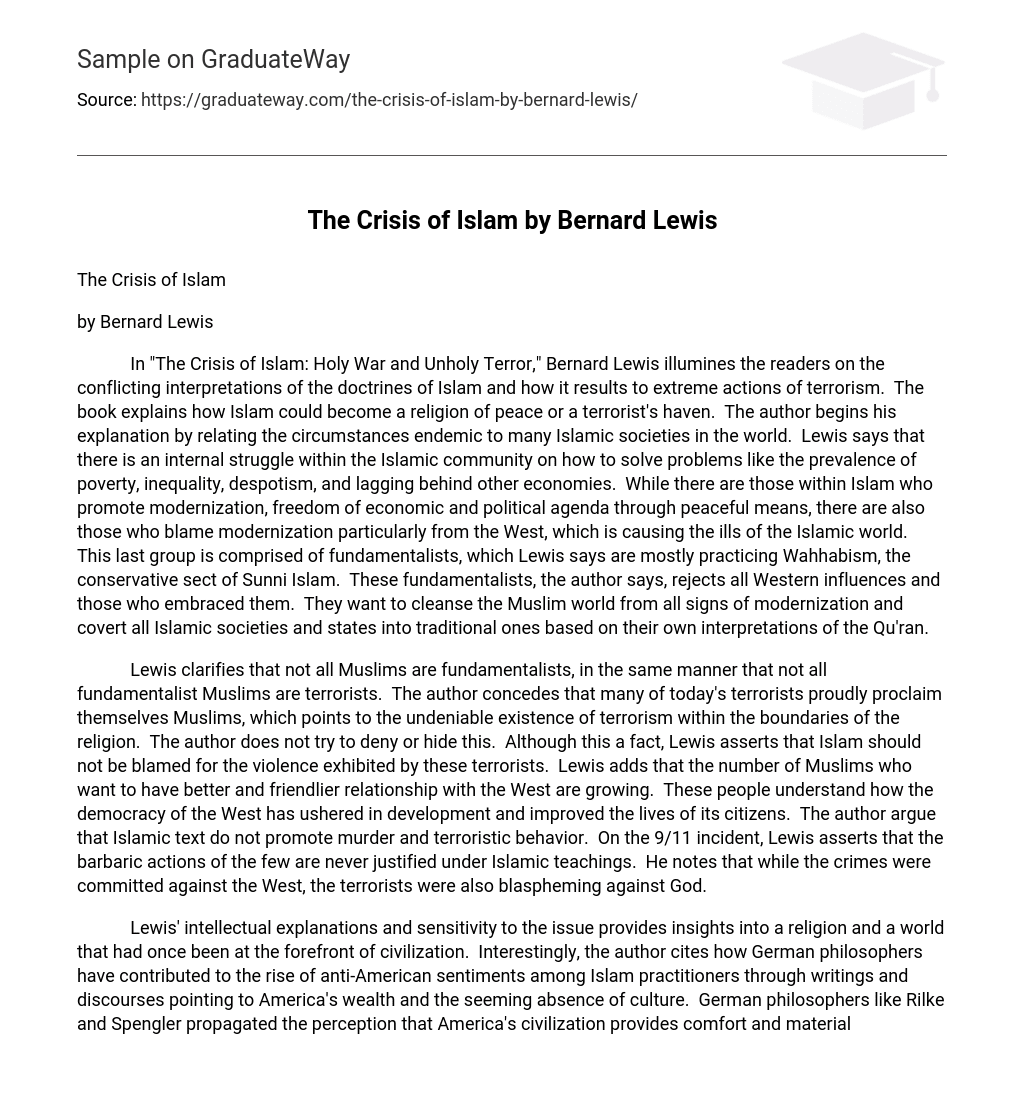In “The Crisis of Islam: Holy War and Unholy Terror,” Bernard Lewis illumines the readers on the conflicting interpretations of the doctrines of Islam and how it results to extreme actions of terrorism. The book explains how Islam could become a religion of peace or a terrorist’s haven. The author begins his explanation by relating the circumstances endemic to many Islamic societies in the world. Lewis says that there is an internal struggle within the Islamic community on how to solve problems like the prevalence of poverty, inequality, despotism, and lagging behind other economies.
While there are those within Islam who promote modernization, freedom of economic and political agenda through peaceful means, there are also those who blame modernization particularly from the West, which is causing the ills of the Islamic world. This last group is comprised of fundamentalists, which Lewis says are mostly practicing Wahhabism, the conservative sect of Sunni Islam. These fundamentalists, the author says, rejects all Western influences and those who embraced them. They want to cleanse the Muslim world from all signs of modernization and covert all Islamic societies and states into traditional ones based on their own interpretations of the Qu’ran.
Lewis clarifies that not all Muslims are fundamentalists, in the same manner that not all fundamentalist Muslims are terrorists. The author concedes that many of today’s terrorists proudly proclaim themselves Muslims, which points to the undeniable existence of terrorism within the boundaries of the religion. The author does not try to deny or hide this. Although this a fact, Lewis asserts that Islam should not be blamed for the violence exhibited by these terrorists.
Lewis adds that the number of Muslims who want to have better and friendlier relationship with the West are growing. These people understand how the democracy of the West has ushered in development and improved the lives of its citizens. The author argue that Islamic text do not promote murder and terroristic behavior. On the 9/11 incident, Lewis asserts that the barbaric actions of the few are never justified under Islamic teachings. He notes that while the crimes were committed against the West, the terrorists were also blaspheming against God.
Lewis’ intellectual explanations and sensitivity to the issue provides insights into a religion and a world that had once been at the forefront of civilization. Interestingly, the author cites how German philosophers have contributed to the rise of anti-American sentiments among Islam practitioners through writings and discourses pointing to America’s wealth and the seeming absence of culture. German philosophers like Rilke and Spengler propagated the perception that America’s civilization provides comfort and material wealth to its people but its kind of civilization is artificial and soulless.
This view on the technological advancement but moral and spiritual decline in America had become popular with the Arab’s intellectual community and would explain why the United States become the primary target of terroristic groups. Lewis’ expertise on the subject matter is remarkable and would help readers gain better understanding of the complexity of Islam and how certain groups have perverted its doctrines to use as an excuse to commit atrocities and violence against anyone who do not share their views.
Finally, in this book, the author suggests that the resolution of conflict between the fundamentalist Islam and the Western world could result into two things, either Muslim communities adapt and exist along side its Western counterparts, or the war could worsen and become a struggle between Muslim and non-Muslims.
Work Cited
- Lewis, Bernard. The Crisis of Islam: Holy War and Unholy Terror. USA: Reed Business Information, Inc., 2003.





